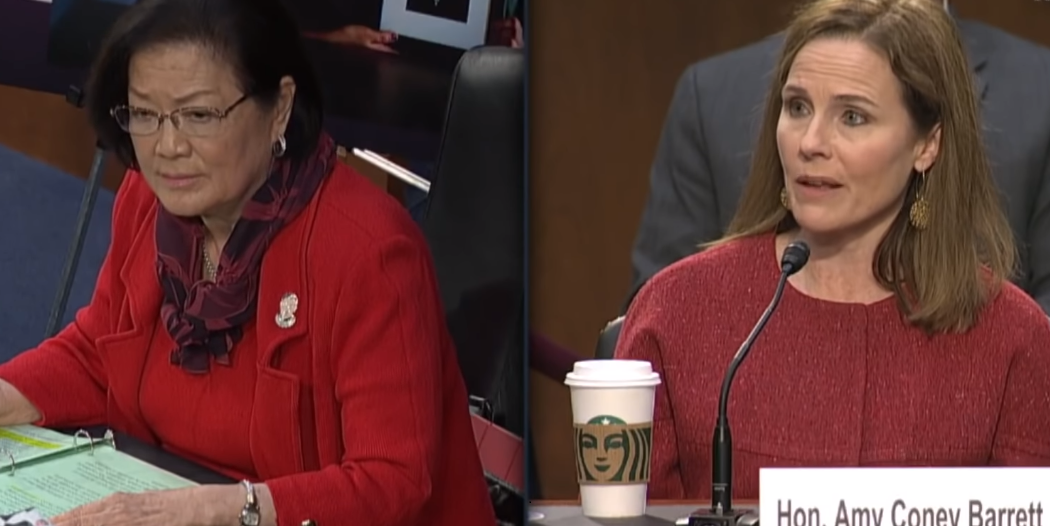(Screengrab from PBS NewsHour‘s Official YouTube Account)
California Senator Dianne Feinstein asked Supreme Court nominee Amy Coney Barrett regarding her stance on equal rights during the confirmation hearing on Tuesday.
Specifically, Sen. Feinstein asked Barrett if she would “be a consistent vote to roll back hard-fought freedoms and protections for the LGBT community” like her mentor, the late Justice Antonin Scalia, if she were confirmed.
Barrett said that discrimination on the basis of sexual preference is “abhorrent.” She, however, refused to answer Sen. Feinstein’s question. Take a look at her statement below:
I have no agenda, and I do want to be clear that I have never discriminated on the basis of sexual preference and would not ever discriminate on the basis of sexual preference. You know, like racism, I think discrimination is abhorrent. On the questions of law, however, I just—because I’m a sitting judge and because you can’t answer questions without going through the judicial process—can’t give answers to those very specific questions.
It was not the only question with which Barrett had refused to give a direct answer.
She was also asked about her stance on the upcoming Affordable Care Act case and whether or not she will support the overturning of Roe v. Wade.
Barrett, however, declined to give a clear response on both issues as well making Sen. Feinstein in the end, say, “On something that is a major cause with major effects on half the population…it’s distressing to not get a straight answer.”
Moreover, Barrett alarmed various LGBT groups with her use of the phrase ‘sexual preference’ including Senator Mazie Hirono (D-Hawaii). The latter rebuked Barrett for using the phrase, saying it is “offensive and outdated.”
“Even though you didn’t give a direct answer, I think your response did speak volumes not once but twice. You used the term sexual preference to describe those in the LGBTQ community. And let me make clear, sexual preference is an offensive and outdated term,” Sen. Hirono said.
Further, Sen. Hirono explained, “It is used by anti-LGBTQ activist to suggest that sexual orientation is a choice. It is not. Sexual orientation is a key part of a person’s identity, that sexual orientation is both a normal expression of human sexuality and immutable was a key part of the majority’s opinion in Obergefell.”
Watch the moment happen below:
Let me make clear – sexual preference is an offensive and outdated term.
— Senator Mazie Hirono (@maziehirono) October 13, 2020
To suggest sexual orientation is a choice? It's not. It's a key part of a person's identity.
The LGBTQ+ community should be concerned with #WhatsAtStake with Judge Barrett on the Supreme Court. pic.twitter.com/4TWyATMX0Y
For its part, the Meriam-Webster dictionary has now updated its definition for the word “preference,” PinkNews UK reports. They added the following: “The term preference as used to refer to sexual orientation is widely considered offensive in its implied suggestion that a person can choose who they are sexually or romantically attracted to.”
Barrett later apologized for using the term “sexual preference,” saying, “I certainly didn’t mean and would never mean to use a term that would cause any offense in the LGBTQ community.” She also clarified that her refusal to respond directly to the question was “certainly not indicating disagreement with [Obergefell].”
Read the story in full here and here.
Meanwhile, Senator Patrick Leahy (D-Vt.) asked Barrett about her “close ties” with Blackstone Legal Fellowship—a project of the anti-LGBTQ hate group Alliance Defending Freedom (ADF). According to Washington Blade, Sen. Leahy asked Barrett if she was “familiar with the law firm’s filings in support of keeping same-sex relations criminalized in the United States, and recriminalizing them abroad.”
Sen. Leahy said:
They celebrated when India restored a law punishing sodomy with 10 years in prison. Now I don’t—whether you believe being gay is right or wrong is irrelevant to me, but my concern is you worked with an organization working to criminalize people for loving a person that they’re in love with. So, that’s what worries me.
Barrett, on the other hand, downplayed her involvement with them, saying, “As you said, I gave a one-hour lecture on originalism. I didn’t read all the material that students were given to read. That had nothing to do with my lecture. I enjoyed teaching the students about what my specialty was, which was constitutional law.”
Barrett added, “Nothing about any of my interactions with anyone involved in Blackstone were ever indicative of any kind of discrimination on the basis of anything.”
It can be remembered that Alliance Defending Freedom (ADF) represented R.G. & G.R. Harris Funeral Homes, Inc. against the late Aimee Stephens, a funeral director for almost six years at the aforementioned funeral home.
Ms. Stephens was promptly fired after coming out to her workplace as a transgender woman. The Supreme Court of the United States (SCOTUS) ruled last June that it is illegal for employers to fire workers simply for being gay or transgender because this violates Title VII of the Civil Rights Act of 1964. Read more about this here.
During an interview with Washington Blade, a legal director for Lambda Legal named Sharon McGowan condemned Barrett for her refusal to denounce ADF.
McGowan said, “Clearly, Judge Barrett sees no inherent problem with her affiliation with ADF, which is deeply problematic to us and should be to anyone who cares about LGBTQ people and our families.” She added, “ADF is among the largest, best known, and most extreme of the many anti-LGBT legal organizations, so her claim that she isn’t aware of their hostility toward LGBTQ people is disingenuous at best.” Read more of this story here and here.
Netizens of course, have things to say about the confirmation hearing:
We have the receipts. Three years ago, Barrett was pressed about her affiliation with ADF & was told about their disgusting anti-LGBTQ actions.
— Human Rights Campaign (@HRC) October 13, 2020
She can't deny it: She had the group's leader join her Rose Garden superspreader nomination party. #WeDissent https://t.co/5KYtOqvzSi pic.twitter.com/bLoq6I24pE
It's not a "preference," Judge Barrett. #BlockBarrett #SCOTUSHearing #OurCourt pic.twitter.com/V2drHlRK9z
— National Women's Law Center (@nwlc) October 13, 2020
It’s not a sexual “preference,” Judge Barrett. A preference is something you choose. I’ll give you and example: “I have a preference for non-radical, non-fundamentalist justices on the Supreme Court.” Are we clear?
— George Takei (@GeorgeTakei) October 13, 2020










A little thin skinned there to be calling it a slur.
But th n again, I am old enough to have lived what Brokeback Mountain portrayed.
While I acknowledge the context is different, I find it both ironic and amusing that every A4A profile contains the phrase “Sexual preferences”
Look again MTS. “Sexual preference” does not appear in the profiles.
Well actually the phrase clearly does appear in every profile. However it is not used to label an orientation. Rather it is used to declare if one is a top, bottom, versatile, etc,.
It appears in my profile. It says “Sexual preferences” and the choices are Top, Bottom, Vers…. etc. Is this not in your profile?
So, my sexual preference are REAL MEN who have thick fur on their chests and need a case of razors a month.
“our society has come to respect people, whatever their sexual preference” – Ruth Ginsberg 2017
I hope my comment is not censored by Dave.
Thank you
why would I censor it.
It’s not about politics…it’s about views.
Ginsburg is not anti-gay, it is known, she is pro gay.
Barrett is anti-gay religious freak. Different.
I mean she may not be the best choice, and as a bi Male I guess it affects me differently but even I didn’t know that sexual preference was offensive. I guess since I can prefer either it isnt an issue to me but I guess I can see how it may be offensive to others in my community
exactly my thought too.
As a kid raised by a baptist pastor family, “sexual preference” is offending as fuck.
What a joke. See the bogey man and ye shall find. “Preference” could be found on multiple lgbtq sites and nobody blinked an eye. Now all of a sudden it’s offensive. Pleeeeease
Coming from an anti-gay bitch, yeah it’s a slur!
It’s like if a white guy calls a black guy the N word.
Coming from his bros, that’s fine too…
same thing here.
All due respect Dave, either a term is offensive or it is not. There can be no double standards.
This is just a silly insane comparison. Everyone is entitled to their view, and if they are offended by “sexual preference” that can be their right, but at least be consistent about it.
not silly at all…
So Biden is a bigot also, he’s used the term during this run.. You can’t have it both ways.. its just intellectually dishonest.
She needs to go away that man hater. Cannot wait for her to run for senate again. We Hawaii people gonna get Crazie Mazie OUT!!!
a4a calls it “Sexual Orientation” and if “Sexual Preference” is a slur, so is “Sexual Orientation”. Why does a4a need to categorize men soley as sexual beings? Is LGBT solely determined by sexual orentation (or practiices or preferences) ? A4A completely objectifies men sexually which is wrong. And in this context, interst is similar enough to use interchangeably with preference. If this is all you got against here, youngot nothing Also, according to Webster’s: 2 a : a usually general or lasting direction of thought, inclination, or interest the fundamentally human orientation of Greek art — Bruce Cole This company has a decidedly… Read more »
honey, we are a dating/hookup service…
“Is LGBT solely determined by sexual orientation . . .” YES! ! That’s the difference on which the judgement is based from both sides of the discussions. Chances are, if you aren’t one of those letters, you haven’t been treated differently than 90% of the rest of the people on the planet simply for being yourself.
So tired of everyone In “our” community getting butt hurt by an innocent statement such as “sexual preference.“ For me, and most “bi-sexuals” it is a preference so Judge Barrett is correct. Not everyone is born gay and environmental factors do play a part in ones lifestyle choices. If people such as “Sulu” don’t understand that and insist on making everything personal we are already Doomed!
Reaching a bit, aren’t we? This is so ridiculous!
Hirono is a Freak..Stop with the PC crap..Barrett is going to be our next Justice!
Barrett is a religious fucked up person and she doesn’t belong in that position imo.
If you wanted to get folks involved in a heated discussion, you succeeded! Go Dave!
and Trump loves to pick people like that on purpose.
Well the, thank goodness you are not in a position to impose your will on the American people. Dave, like it or not you various comments on Judge Barrett, is as intolerant as they can be.
I don’t like her.
I dont like religious people who try to impose their faith on others. You can be religious if you want, but if that has an impact on how you judge at the court, I have a big problem with that. A judge has to be impartial.
And your comments are still intolerant, the Justice’s roll in the US Supreme Court is to interpret the Constitutionality of a law passed in the US.
I find “queer” to be as offensive as sexual preference and it seems to be creeping back into our lexicon. I’m gay. There’s nothing queer about me.
Trump keeps picking bigots and he like the stir controversy, and as much I dislike Barret or any of his neo conservative pricks, I do find this a reach. Is the term outdated?, more so, but to take this on a whole level of being highly offensive or discriminatory is carried away. she like all trumps pricks avoids straight forward questions when being questioned on their stance on several topics.
You don’t need to find it offending to understand that others can be offended though.
As for the rest of your comment, I agree!
This article can not be any more left leaning and anti open minded than the term they try to profess to be a SLUR!
How sad…..trying to manipulate, control and influence those who support your business.
open minded?
imo, this is closed minded.
I didn’t know that a gay blog that “protects” its members could be interpreted as manipulating and controlling.
Oh well.
I’m not letting it shake me up, her ignorance, plain and simply put: Nobody chose to be anything as it pertains to “what floats their boat.” We simply chose to ‘acknowledge’ what sex (male or female or both) we are genetically-sexually turned-on by, this is the point of “orientation”= getting acquainted with . . . she may have misspoke and she may not have.
However as far as evangelistic folk goes, most of their doctrine is nothing more than programmed hate, nothing “God” inspired about it. They commonly join church and hate=politics.
ah finally. This is exactly my thoughts as well. And as a son of a preacher, I can tell you that this is a fact.
I went to church for 18 years of my life, and my dad is still a preacher, so I know.
The great news that it’s now is that it’s now 2020! Untold numbers of pastors and preachers actually do preach acceptance! it is truly a blessing that their children do not endure what you have endured in your life.
ahaha you would be surprised…
And the other thing they seem to fail miserably; the understanding that your treatment- behavior towards other people-souls on earth is what the “Creator” acknowledges. That’s what the “light” of soul is about as we all arrive here on earth as souls of light; “this little light of mine, I’m gonna let it shine”. . . If, you are going to practice deeds of evil, not sin (which Jesus died for) but evil, you’re white-ish skin isn’t gonna give you a pass, “unto thee.” You’ve “blackened” you soul, by these deeds, of destruction of innocent human life, whom the transgression… Read more »
Everyone got the press release that The Community had deemed the term “sexual preference” as offensive a while back, right? If not, contact your local office of The Community for information.
of course, a gay trumpist that throw his community under the bus.
ah la la…
If you don’t find it offensive fine, others find it offensive, can we freely be offended? Do you give us the permission Hunter?
Barret is more likely going to be the next judge. There is very little that is going to be done about that. But I’m glad that this Senator raised the issue about the phrase. There was a time when being called “colored” was okay to reference a some who wasn’t white. Now most people know how offensive that is today. This is about evolution. We should embrace this evolution. It is important to understand that being gay isn’t a choice, you’re born this way. It isn’t a preference like a flavor. However, this judge like many people may not be… Read more »
What language is preferable to “sexual preference”? Sexual attraction, sexual affinity, same-sex affinity?
Sexual orientation would be more acceptable than using sexual preference. Terms change overtime that are more appropriate and respectful. There was a time when gays would be call buggers, fairies and pansies amongst straights and gays. I don’t think any of those terms are acceptable or flattering today. We change with the times as we learn more. Not everything is totally PC but just a more accurate description of a group of people born that way. The more we know about each other the better we as a society can become. This can start with being respectable about how we… Read more »
Her appointment: to lesson hard-won rights and force more white women to give birth to more white babies.
True, if a court case is pushed up to the Supreme Court level.
This why I post no whites when dating…most will sex a non white person, but go vote for the most racist people in america. Sadly the people they vote for hate them too. LOL
She is a bad choice for a judge. She cannot give a definitive answer to one single question because then people will see her views on an issue and will already know how she will decide a case.
Get REAL countless left wing people including RBG said SEXUAL PREFERENCE. In order for our system to work we must have e a right and left side but the left fell off the cliff or stopped taking their meds. MY SEXUAL PREFERENCE ARE HUNG TOPS. If the term Preference offends you then you’re nutty.
Really?! Sexual preference/orientation…what the hell is the difference? They both have to do with a choice of who you want to be with sexually, it’s that simple. Just more nonsensical PC garbage that causes everyone who’s a sane, rational, LOGICAL human being to have to walk on eggshells. Grow up and man up, liberal snowflakes!